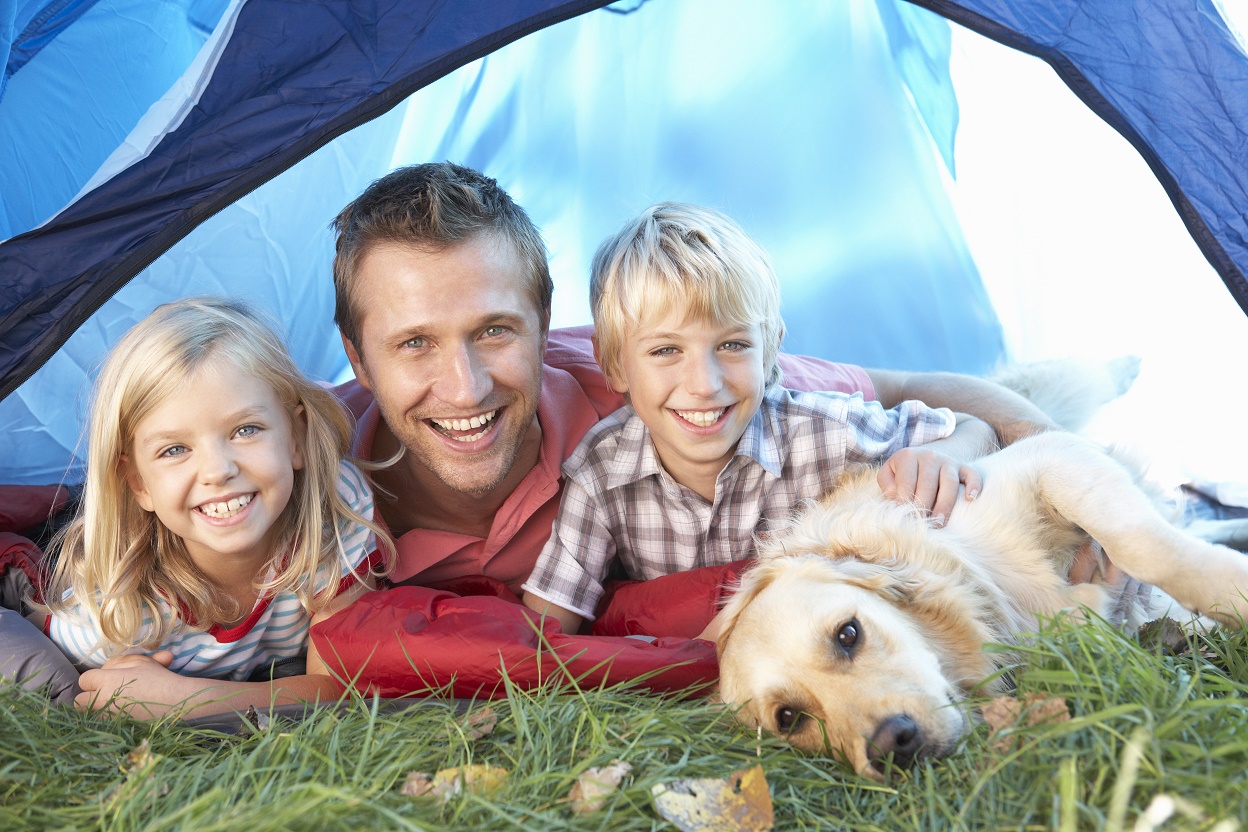 Summer may be winding down, and cooler weather may be upon you depending on where you live in the country. As the lazy days of Summer turn into the cooler days of Fall, we find ourselves able to enjoy some of the best camping weather that the season has to offer. What’s more, camping can be a wonderfully memorable experience that you can share with your four-legged friend. Dogs enjoy being outdoors, exploring their surroundings and like the simplicity that comes from simply spending time with you by the campfire or enjoying a long walk in the wilderness. Planning ahead and using these tips can help to make the experience as fun as possible for all of the members of your family—canine and human.
Summer may be winding down, and cooler weather may be upon you depending on where you live in the country. As the lazy days of Summer turn into the cooler days of Fall, we find ourselves able to enjoy some of the best camping weather that the season has to offer. What’s more, camping can be a wonderfully memorable experience that you can share with your four-legged friend. Dogs enjoy being outdoors, exploring their surroundings and like the simplicity that comes from simply spending time with you by the campfire or enjoying a long walk in the wilderness. Planning ahead and using these tips can help to make the experience as fun as possible for all of the members of your family—canine and human.
1) Take flea, tick, heartworm, and rabies precautions
We all know that we should always be keeping our pets up to date on their flea and tick medications, vaccinations, and heartworm pills. This becomes even more important if you plan on regularly camping with your four-legged friend. Since most campgrounds or national parks tend to be wooded, it’s key that you take every precaution you can to ensure top notch health and as few problems as possible! What’s more, an up to date rabies vaccination is a necessity since your dog is more likely to encounter other dogs on site as well as potential rabid animals! Don’t make the mistake – vaccinate! In addition, make sure that your dog is wearing his latest rabies tag.
2) Prep your dog for new sights and surroundings
If you’re a newbie to camping, consider how your dog will react to the experience ahead of time and do everything that you can to prep him for his new adventure. New sights, sounds, and surroundings can cause your dog anxiety. Make sure that your dog gets plenty of exercise while you are camping – the more attention you give him, the less anxiety induced problems you’re likely to experience. If he’s never spent time camping outdoors, consider walking him in the woods or hiking with him several times prior to your excursion. This can get him used to some of the sounds and surroundings that he will encounter. If your dog is prone to anxiety and you know it is going to pose a problem in advance, talk to your veterinarian about potential options to calm your dog’s nerves. There are medications that your veterinarian can prescribe, as well as other methods (such as the Thundershirt) that can keep your pet cool, calm, and collected. Your veterinarian will know what’s best for your dog.
3) Pack and prep like you would for your children
If you’ve ever seen a family with young children heading to the beach, you likely smiled to yourself as they unloaded the car looking as though they were moving out for the month rather than coming to the beach for the day. When traveling with your pet, the scout’s motto also rings true – Be prepared! Make sure you pack familiar items to keep your four-legged friend comfortable and happy. His favorite blanket and chew toys should be packed, as well as enough treats and food to sustain him during the excursion. It’s better to over pack than under pack. Look at the weather ahead of time, and consider a sweater if it’s going to be chilly or a fan if it’s going to be hot. If there’s someplace to swim and pets are allowed, make sure you bring a life vest for your dog (if he needs it). Call the campsite in advance and request a location with a lot of shade, as tent camping and high temperatures can be a danger to your pet.
4) Be respectful of campground rules and those around you
If a campground or national park allows canine companions on their grounds, the chances are that the other campers around you like dogs and enjoy their company. Still, though; it’s important to respect those around you to make for a pleasant experience for all. Even if your dog typically runs free at home, keep him on a leash and obey campground (and city or state) leash laws. Your dog may be friendly and get along with other dogs, but leashing him could protect him from a potential scuffle with another dog who may not have the same temperament. Always carry dog bags or a “pooper scooper” and clean up after your dog. Just as you would respect your campground neighbors by not blasting loud music at all hours, do what you can to keep your dog’s barking at a minimum. Follow the same courtesies you’d follow at home in your neighborhood.
5) Enjoy each other’s company
Spending time soaking up nature can be one of the most memorable experiences you’ll ever have with your dog and can provide you with a lifetime of memories. Enjoy yourselves.